
- Create account
You can edit almost every page by Creating an account . Otherwise, see the FAQ .

The Speech Prof
Chesko (born January 26, 1982), better known as The Speech Prof , is an American social media influencer and academic. [1] [2] [3]
Early life and education [ edit ]
Chesko's father immigrated to the United States from El Salvador.
Chesko's post-secondary education focused on speech communication and rhetoric. He received a Bachelor of Arts from San Francisco State University in 2006, then a Master of Arts from Arizona State University in 2009. [4]
Career [ edit ]
Chesko began his academic career working at Glendale Community College. In 2013, he began working in the Los Angeles Community College District . As of 2023, he is a full professor and was Director of Forensics. [4]
Chesko created his YouTube account TheRealSpeechProf in March 2021. Many of his videos discuss compassionate pedagogy and address toxic masculinity. In 2022, he responded to a video from the No Filter podcast, which discussed women's body after giving birth. In his video, he talked about his relationship with his wife and how he doesn't see flaws in her image. The video went viral. [5] [6]
References [ edit ]
- ↑ "Inaugural speech prof.dr. T. Filatova (Faculty of TPM)" . tudelft.nl .
- ↑ "Husband's response to misogynistic podcast about women's bodies after childbirth goes viral" . scoop.upworthy.com . 8 February 2022.
- ↑ 4.0 4.1 "The Speech Prof AKA Professor Chesko" . LinkedIn . Retrieved 2023-10-13 .
- ↑ Joseph, Jisha (2022-02-08). "Husband's response to misogynistic podcast about women's bodies after childbirth goes viral" . Upworthy . Retrieved 2023-10-13 .
- ↑ "Man's Response To A Toxic And Misogynistic Podcast About Women After Giving Birth Goes Viral" . Bored Panda . 4 February 2022.
This article "The Speech Prof" is from Wikipedia . The list of its authors can be seen in its historical and/or the page Edithistory:The Speech Prof . Articles copied from Draft Namespace on Wikipedia could be seen on the Draft Namespace of Wikipedia and not main one.
Be the first penguin. Click the penguin to learn how Randy used penguins as a motivating tool »
If you can't see the videos below, please revisit this page using a web browser which supports JavaScript .
Randy Pausch's Last Lecture

On September 18, 2007, Carnegie Mellon professor and alumnus Randy Pausch delivered a one-of-a-kind last lecture that made the world stop and pay attention.
It became an internet sensation viewed by millions, an international media story, and a best-selling book that has been published in more than 35 languages. and it all started with randy », the last lecture: book & dvd.
Millions of copies have been sold, making "The Last Lecture" a favorite of kids, parents and teachers around the world. Fellow Carnegie Mellon alumnus, the late Jeff Zaslow , joined Randy Pausch in writing the book based on Randy's famous speech.
- About the book
- For educators (Disney Edition)
An Interview with Randy
Before his death in 2008, an interview was conducted asking Randy nearly 400 questions submitted by colleagues and students alike. Now you can ask Randy about his childhood, family, research and passions. His answers from this interview are moving, funny, thought provoking and extraordinary.
Ask Randy a question »
Carnegie Mellon
A faculty member, researcher and mentor at Carnegie Mellon, Randy was involved in a number of university departments and initiatives. Among those:
- School of Computer Science
- Human-Computer Interaction Institute
- Entertainment Technology Center
Has Randy's lecture impacted your life? Share your story.
Carnegie Mellon University , 5000 Forbes Avenue, Pittsburgh, PA 15213 | Contact Us
Husband's response to misogynistic podcast about women’s bodies after childbirth goes viral
'Every 'flaw' that she sees is part of our history. Everything she doesn't like about herself reminds me of our three beautiful children,' he said.
A Communication Studies professor's emotional response to a sexist podcast discussing how women supposedly "let themselves go" after giving birth is going viral on social media. Professor Chesko, who goes by @speechprof on TikTok, filmed the video in response to seeing three men from the No Filter podcast speaking about how they'd break up with their child's mother if she didn't bounce back to her pre-pregnancy body. "I say, if my wife lets herself go after I've had kids with her, I'm gonna tell her once, if you don't get your sh*t together—I still want to be sexually attracted to my wife/my spouse/girlfriend—if you can't do that, I'm out," one of the hosts says, causing quite a stir on the platform from folks who do not condone the misogynistic message.
Professor Chesko reacted to the toxic idea put forth by the No Filter podcast with a personal anecdote from his marriage. "I do portrait photography and my wife once asked me why I don't edit her photos the way I edit my client photos and I didn't know what she was talking about," he shares in the video. "And she said, you know, you take off all of their flaws and their wrinkles and everything else about them. And I was like, I remove. I do the same to yours and she was like, no you don't."
@speechprof #stitch w/@No Filter Pod If that original video resonated with you, then I have to believe that you have never known love. #toxicmasculinity #redflags ♬ original sound - Professor Chesko (He/Him)
"And it took me a while to realize that I can't edit her photos because there are no flaws. Every 'flaw' that she sees is part of our history. Everything she doesn't like about herself reminds me of our three beautiful children. And I just can't fathom thinking the way this guy in this video thinks," a visibly emotional Professor Chesko concluded. His video resonated deeply with many on the platform, racking in over 10.6 million views in less than a month.
@speechprof Reply to @snowreza Here you go, my best friend in life, crime, and comedy. #wifereveal #husbandtok #dadtok ♬ So Close (From "Enchanted") - Kids R Us Band
Speaking to Bored Panda about how shocked he was by how much attention the video received, Professor Chesko said: "I've had a few other videos get a couple million views, but the reaction was nothing like this. The overwhelming positivity in comments, emails, stitches, and DM's from people has been one of the greatest experiences of my career and just shows why it is so important to allow yourself to be vulnerable to an audience. I just filmed one take from the heart and quickly captioned and posted it right before I had to sign into a department meeting—I think that's one of the reasons it resonated so much with people though. If I had tried scripting something like this, it would have felt very disingenuous."
@speechprof Reply to @nickyd92212 and if she is only able to see herself through my eyes for just a little bit, that’s gotta count for something. #thebarissolow ♬ Steven Universe - L.Dre
The professor, who has been married to his wife for 11 years, revealed that he initially wasn't too keen on the idea of marriage. "I grew up with a single mom and a toxic father that wasn't really a part of my life, so I'm kind of winging it as I go as far as this marriage thing is concerned," he said. "I didn't actually ever even want to get married since I only knew it as this hurtful thing, but that changed almost immediately when I started dating her—I even started saving up for an engagement ring just a few months after we started dating and proposed just a couple weeks before our 1-year-anniversary."
@speechprof Reply to @speechprof You’re just telling on yourself. #thebarissolow #redflags #toxicmasculinity ♬ See You Again (Piano Arrangement) - Alexandre Pachabezian
When asked about what he believes is the key to a successful and happy marriage, Professor Chesko said it was important to "love your partner recklessly." "What I mean by that is that you need to love without reservation and concern of reciprocation and if they love you back the same way, then even all the hard stuff just seems to fade away. So even when the times are tough, and we've had rocky times just like any other couple, the love is still always there keeping us anchored to one another," he said.
43-year-old reveals an ingenious way to use a cheese grater and it's blowing people's minds
Man shares hack to get your wife to instantly decide where to eat and it's pure genius, man plays along with a 'karen' who started bullying him for no reason and it's absolutely hilarious, boy lets loose during school concert and busts out adorable dance moves: 'this kid has got talent', boyfriend's reaction before and after seeing his girlfriend is putting a smile on everyone's face.

The University of Chicago The Law School
Fostering free expression, law school faculty have been pivotal in advancing uchicago’s commitment to free speech, inquiry, and debate.
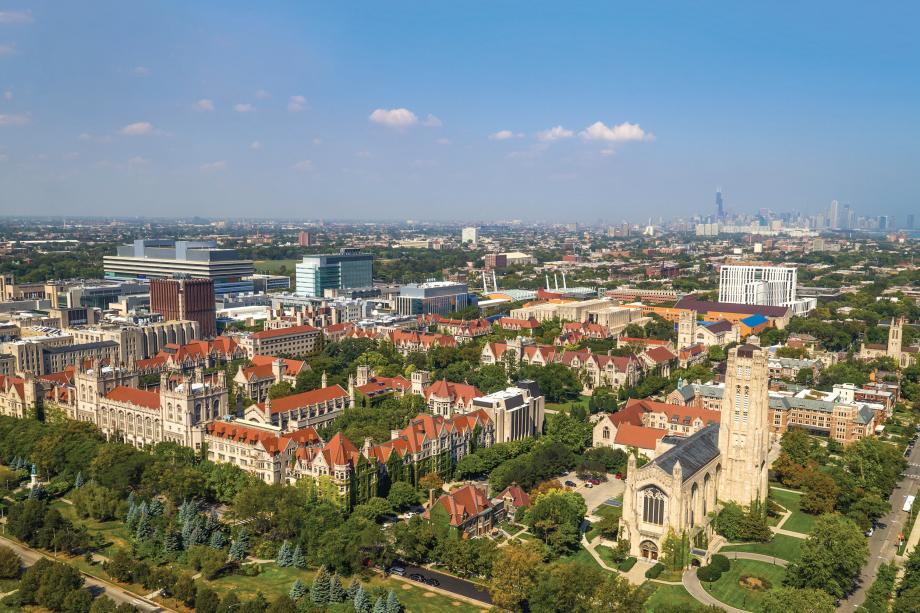
Tom Ginsburg grew up in Berkeley, California, in the years after the free speech movement swept the UC Berkeley campus. As a child, he’d hear about the importance of free expression from those who took part in the movement, especially his father, and learned to speak freely, question his own knowledge, and listen closely to those with whom he disagreed.
The afterglow of those protests for academic freedom lit the path of his career in law and academia. Ginsburg was fascinated by the role of free expression in a democratic society. Today, he’s one of the world’s most widely published and respected scholars of democracy.
But lately, Ginsburg has felt concerned about the future of academic freedom. In the United States, where freedom of speech is cemented in law by the First Amendment, people have grown cautious in what they express, often to the point of self-censorship. Fear of reprisal from others who disagree with them is a driving factor, according to a poll of more than 1,500 US residents by the Sienna College Research Institute and the New York Times . This poll found that 55 percent have not spoken freely at some point in the past year due to concerns over potential retaliation or harsh criticism. And this fear is greater for younger Americans, the poll found, as 61 percent of people ages 18 to 34 said that they’ve held their tongue over the past year.
I don’t think you can have free societies without free universities. Tom Ginsburg
A combination of social media, the prominence of live cameras, and the trend of vast public scorn for private citizens has led to more self-censorship. But self-censorship means that fewer ideas are being publicly debated in good faith. As this trend grows, good ideas go untested, bad ideas go unchallenged, and a free society feels more restricted.
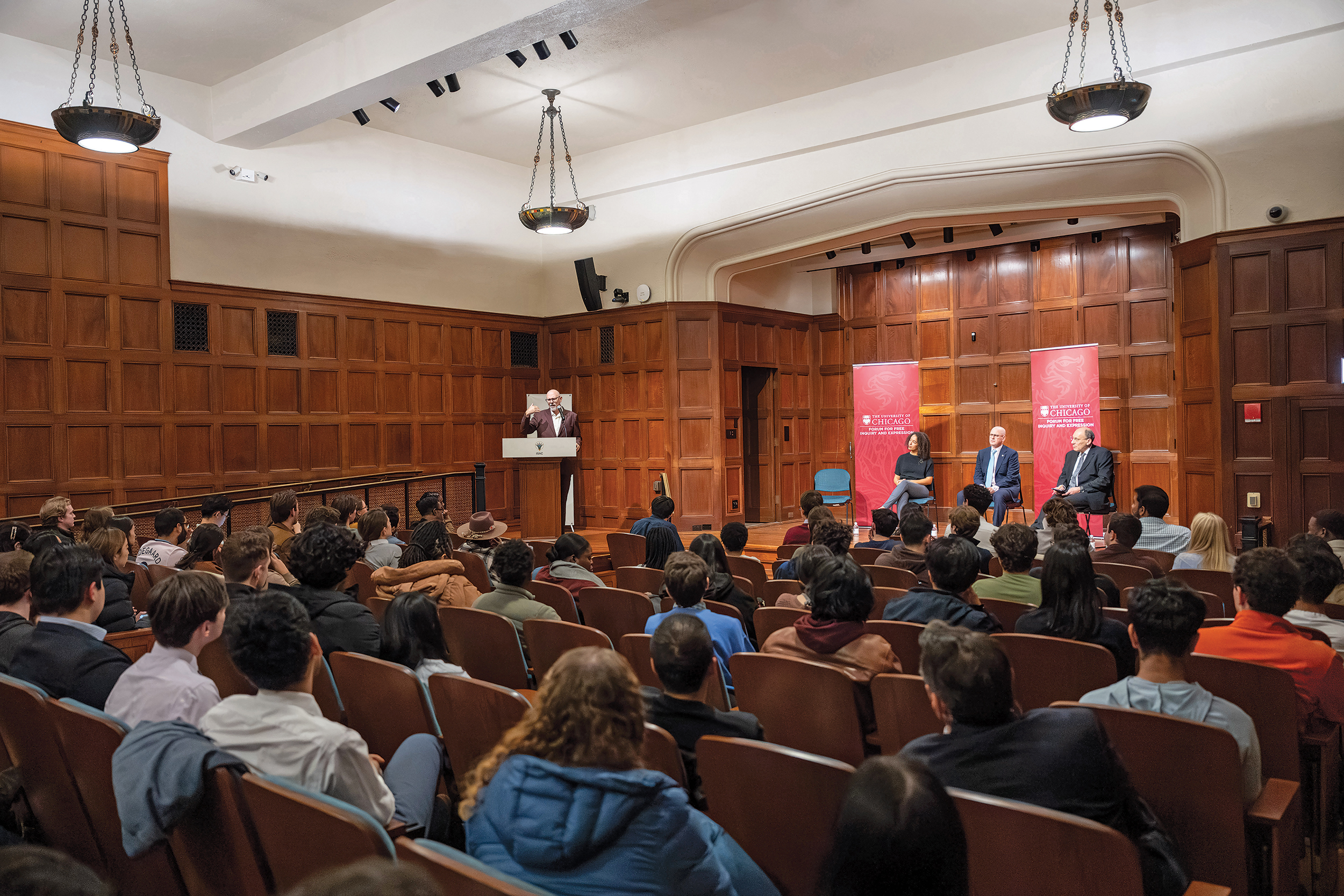
“Everyone thinks that everything they say and do is going to be broadcast and out there forever,” said Ginsburg, the Leo Spitz Distinguished Service Professor of International Law at the Law School. “That leads people to be reluctant to speak. That, of course, is something we must overcome.”
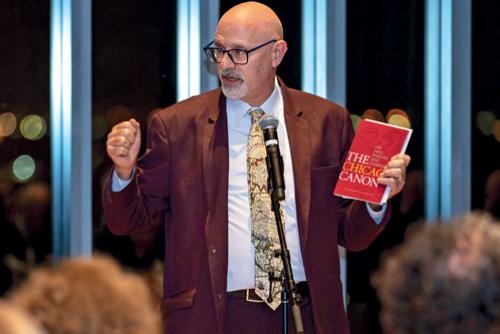
Aside from self-censorship, the threat of governmental and administrative censorship looms over universities. Ginsburg says that universities are often the first to feel pressure when free expression is under threat, which may look different depending on location. In the United States, universities may see state budget cuts or policy changes in response to forms of expression found unfavorable by those in power, especially in a polarized political climate. But in countries with little or no protection of free expression, consequences can be far more dire. Sulak Sivaraksa, a professor in Thailand and one of Ginsburg’s mentors, was recently arrested for insulting the king . The perceived insult? An opinion Sivaraksa had about a battle that occurred more than 500 years ago.
“I’ve noticed that universities are pretty vulnerable to attack, and not very well equipped to withstand it,” Ginsburg said. “I don’t think you can have free societies without free universities. Democracy needs truth-telling institutions.”
Launching the Chicago Forum for Free Inquiry and Expression
Last year, University of Chicago President Paul Alivisatos took Ginsburg out to breakfast, where he asked if Ginsburg wanted to be the faculty director of a new University initiative called the Chicago Forum for Free Inquiry and Expression. The Chicago Forum would promote the understanding and practice of open discourse at UChicago and beyond.
Ginsburg, whose recent book Democracies and International Law had just won the American Branch of the International Law Association’s 2022 Book of the Year Award , thought the forum sounded like the perfect way to continue his life’s work.
“I thought about it for about five seconds and then said ‘yes,’” Ginsburg said.
Given his legal scholarship, Ginsburg seemed the right person for the job. But he had also been honing practices of free expression with students at the Law School, providing opportunities to have discussions on complex, controversial topics. For example, Ginsburg would have students discuss what separates hate speech from free speech. Who decides what becomes hate speech, and how it is punished? Ginsburg wanted future attorneys, who will have to deal with a career full of disagreements, to become comfortable with sharing differences of opinion in a low-stakes learning environment without fear of public scorn. “Part of the way to construct the environment is to insulate them from social media,” said Ginsburg. “That’s one of the things we have to do to get this right.”
Ginsburg also started a series of roundtable lunches in 2015 just before Donald Trump was elected as US president. The anger level on campus had risen, and Ginsburg wanted to find a way to cut through the anger by allowing students to debate and learn about ideas from multiple perspectives. During these lunches, professors would take opposite sides of an issue and, along with students in attendance, discuss each side’s positions, searching for common ground. “It was really fun,” Ginsburg said. “My colleagues loved it, because that’s what we do all day anyway.”
Last year, Ginsburg presented at orientations about the University of Chicago tradition of free expression for divisions across campus, engaging with them on why it’s essential to academic freedom. For example, he hosted an orientation event for the physics program to discuss differences in opinion on climate change. “They’re confronted with some cases where there are really deep divisions,” Ginsburg said.
Ginsburg hired Tony Banout—who earned his PhD in political and religious philosophy and ethics from UChicago—as the Chicago Forum’s executive director. Both have been working closely to build the forum, which publicly launched in October with a series of in-person panel discussions . Soon, the forum will offer academic grants and fellowships, as well as host more discussions, including the Academic Freedom Institute , planned for 2024 and designed for academics and administrators in higher education.
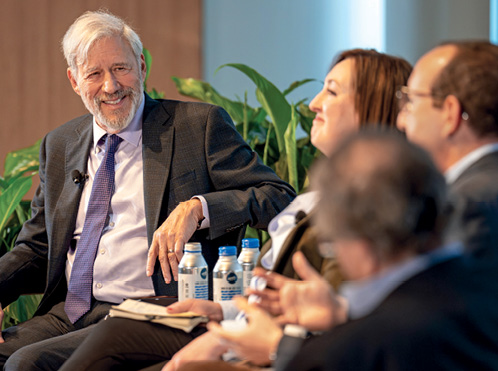
Geoffrey Stone, the Edward H. Levi Distinguished Service Professor of Law and a nationally renowned free speech expert, says that the Chicago Forum exists on the premise that free speech is a force for good. Amid a moment when free expression is chilled, Stone says that the forum could help give people the tools to reengage in their own forms of free expression.
“Part of the idea is to figure out how universities can be more effective at encouraging students and explaining why freedom of expression is important,” Stone said. “Even when the ideas someone is articulating are things you strongly disagree with, they should be allowed to do that.”
The Law School’s History of Free Expression
When William Rainey Harper was named the University’s first president in 1891, he brought a then-unorthodox style of open scientific inquiry. This philosophy of open inquiry served as the foundation of UChicago’s rich history of free expression . Harper said in 1902 that free expression is a fundamental part of UChicago and that “this principle can neither now nor at any future time be called in question.”
And while other universities have, at times, wavered in their support of free expression, UChicago has always stood behind it, even amid painful moments. In 1932, the University drew public ire for inviting a presidential candidate from the Communist Party to speak. Robert M. Hutchins, then president of UChicago, responded to the backlash by saying that the cure for ideas we oppose “lies through open discussion rather than through inhibition.” In 1967, when universities felt pressure to take stands on social and political issues, the University released a statement drafted by a committee—chaired by Law School professor and First Amendment scholar Harry Kalven Jr.—stating that if UChicago took any collective position, it would be akin to censuring those who disagreed with that position.
“The neutrality of the university as an institution arises then not from a lack of courage nor out of indifference and insensitivity,” said the statement, which came to be known as the Kalven Report . “It arises out of respect for free inquiry and the obligation to cherish a diversity of viewpoints.”
In the 2010s, campuses nationwide saw an uptick in interruptions and disinvitations of speakers. At UChicago, professors from the Law School were tapped to serve as chairs of committees that examined how its historic commitment to free expression could be renewed and strengthened within the challenging moment. Under the leadership of Law School faculty members, each of these committees crafted influential reports on free expression.
Part of the idea is to figure out how universities can be more effective at encouraging students and explaining why freedom of expression is important. Geoffrey Stone
David Strauss, the Gerald Ratner Distinguished Service Professor of Law, served as committee chair for the Ad Hoc Committee on Protest and Dissent , which was created in response to demonstrations and controversy taking place at the University of Chicago Medical Center. The committee’s report affirmed that dissent and protest are integral to the life of the University. Its recommendations included a limit on protest that threatens sensitive facilities as well as minimal police involvement in protest whenever possible. The report also suggested introducing students to specific policies that govern protest and debate.
Later that year, Stone chaired the Committee on Freedom of Expression, which produced a report that came to be known as the Chicago Principles . The report laid out how the University has and will continue to treat free expression: debate is welcomed, students can vigorously discuss even the most offensive ideas, and it is not the University’s place to judge student’s ideas nor suppress their speech.
“It was an effort to articulate clearly what has long been the tradition and values of the University,” Stone said. “It wasn’t meant to change anything. It was meant to simply articulate what have long been our institution’s values and goals. What makes UChicago special is that in all historical circumstances, it has backed the principle of free speech and supported students, faculty, and speakers in their ability to set forth what they believe to be appropriate positions, even though many members of the faculty, the student body, and the community might not agree. We were unique and powerful in doing that.”
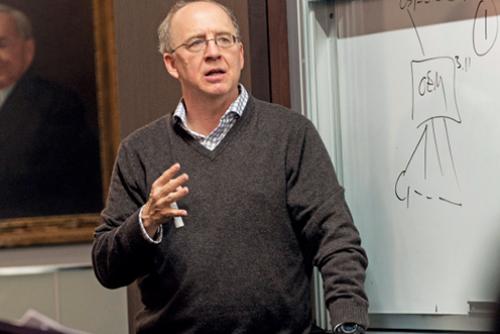
Though the Chicago Principles were meant for UChicago, other universities took notice. They too had felt heavy pressure to make statements on political and social issues, watched an increasing number of campus protests, and heard demands from students to suppress certain forms of expression. Quickly, many other universities adopted the Chicago Principles for their own campuses. In 2015, Princeton University was one of the first to adopt them, using the Chicago Principles as the starting point for their own Princeton Principles for a Campus Culture of Free Inquiry . The Princeton Principles, written in 2023, say that “universities have a special fiduciary duty to foster freedom of thought for the benefit of the societies that sustain them.” Now, nearly 100 other universities have adopted the Chicago Principles . In addition, the American Bar Association is considering whether it should amend its law school accreditation standards to adopt the Chicago Principles.
In 2017, the third UChicago report on free expression came via the Committee on University Discipline for Disruptive Conduct, chaired by Randal Picker, the James Parker Hall Distinguished Service Professor of Law. Picker says that he and members of the committee had watched on, in horror, as other campuses experienced violence amid protest . He hoped that his committee’s report could transparently explain rules for engagement for student protest while avoiding punishment, violence, and destruction.
The Disruptive Conduct report listed a series of framing principles for student disciplinary matters—those who disobeyed could be disciplined. Students are within their rights to protest and object to speech, the report said, so long as they don’t block or disrupt the ability of others to speak or hear a speaker. This rule combats what Kalven called the “heckler’s veto,” where a speaker is silenced, drowned out by noise, or threatened to the point of no longer speaking. The heckler’s veto has recently become a common tactic used by protestors who want to shut down controversial speakers.
Making sure that students understand the rules of engagement and their shared obligations has been key. Randal Picker
“That’s a free speech failure,” Picker said. “[The Chicago Principles] are a broad statement of philosophy. With this committee, we wanted to try to build a regime of education in which we get those principles vindicated. If there’s disruption and a need for a disciplinary regime, OK, we’ve constructed that too, with people trained to make difficult choices. But really, this report is about vindicating speech.”
By the time the Disruptive Conduct report was being written, the Chicago Principles had received national coverage and been adopted by multiple universities. This meant more eyes and more scrutiny on Picker’s report, both while drafting the report and after it was released. But those additional eyes seem to be a good thing for campus protest. Thus far, Picker says there has been little use of the Disruptive Conduct Committee to discipline students, as most have learned the distinction between protest and disruption, including intimidation, violence, or the heckler’s veto. In fact, Picker has seen students who created signs with footnotes citing his report, stating their right to protest.
“That’s fantastic,” Picker said. “You stand at the back, you hold up your sign, and you say what you want on that sign. That’s perfect. It’s a way for people to convey their disagreement with the speaker while still allowing the speaker to speak and the audience to hear. Making sure that students understand the rules of engagement and their shared obligations has been key to this, an education process led by University Dean of Students Michele Rasmussen.”
Picker considers the Chicago Forum to be the next chapter in UChicago’s commitment to free expression, following the four faculty committee reports. Those first four reports outlined the principles and rules of free expression for UChicago, Picker says, while the forum has a chance to teach people how to engage in robust speech within a pluralistic society, both on and off campus. This is essential for bringing a strong culture of free expression into the future, Picker believes.
What you need is to have a society where people are exposed to competing views and be willing to think about them. That requires a lot of education, particularly beginning with young people. Geoffrey Stone
“Culture is hugely important,” he said. “I’m part of a shared culture and I benefit from it; therefore, I have an obligation to help preserve it. That says nothing about what substantive positions you take, but the nature of engagement, especially engagement with people who disagree with you.”
The Future of Expression
Part of becoming a great thinker is the ability to debate ideas, Ginsburg says, even taking sides you don’t believe in. Attorneys know this well—the Law School has been the backbone of free expression at UChicago because attorneys are trained to argue, even on the side of clients whom they may privately believe are guilty. After all, everyone deserves a vigorous legal defense.
But the Chicago Forum will reach outside the Law School and even outside UChicago, Ginsburg says, as thinking people must be able to express ideas—even unpopular ideas—and hear criticism, even when it stings. With more younger people feeling the fear of what happens if they say the wrong thing, he wants to be proactive and positive in teaching free expression and why it is essential to society, showing that it is sometimes essential to speak freely through the fear.
“I don’t think ‘free speech’ quite captures what this is about,” Ginsburg said. “It implies a sense of constraint; if we get out of the way, all of this good speech is going to happen. But I don’t see that happening in the world. We need to provide environments and opportunities where students can experiment more.”
According to Ginsburg, the fundamental reason universities care about free expression is because it is essential to inquiry and knowledge creation. If certain topics or conclusions are taboo, learning is stunted. The best opportunity to learn is having a diverse group of people who are willing to listen to one another, have deeper conversations, and speak without fear of retribution. And Stone agrees, saying that these kinds of collaborative but difficult conversations have often changed history.
“If we didn’t have a very strong commitment to free expression in our country, we wouldn’t have had interracial marriage, we wouldn’t have had same-sex marriage, and we wouldn’t have had laws guaranteeing equal rights,” Stone said. “These were all the product of people being willing to stand up and talk about issues that were regarded as highly controversial. It takes courage to do that. What you need is to have a society where people are exposed to competing views and be willing to think about them. That requires a lot of education, particularly beginning with young people.”
As the leader of the Chicago Forum for Free Inquiry and Expression, Ginsburg hopes to inspire students to think and speak freely, rather than focus on winning an argument. He wants to teach students to have conversations that build their knowledge and understanding of the world, just as he was able to do as a student.
“We want to be a place that involves every student in the University, that allows them all to come away feeling included, able to voice their opinions, and develop their views in a healthy way,” Ginsburg said. “That’s the goal.”
Hal Conick is a freelance writer based in Chicago.

Is Israel losing the information war on Gaza?
Marc Lamont Hill talks to documentary producer Sut Jhally about Israel’s information warfare strategy.
As Israel’s attacks on Rafah spark public outrage, Prime Minister Benjamin Netanyahu’s war campaign is coming under fire despite continued support from the United States, raising questions about the efficacy of Israel’s public relations strategy.
Sut Jhally’s 2016 documentary The Occupation of the American Mind exposes the extensive pro-Israeli propaganda that has been targeting American audiences for decades. Since October 7, this narrative, which focuses on combating “terrorism” and the dehumanisation of Palestinians, has intensified.
As the world continues to witness the horrors committed in Gaza, is Israel losing the war for public opinion? Does this signal the decline of a once renowned propaganda machine?
This week on UpFront , Marc Lamont Hill speaks with Jhally, professor emeritus of communication at the University of Massachusetts in Amherst and founder and executive director of the Media Education Foundation, about the media narrative shaping public opinion on Israel’s war on Gaza.
- My View My View
- Following Following
- Saved Saved
US, China lock horns on Taiwan, Marcos slams Beijing at Asia defence summit
- Medium Text
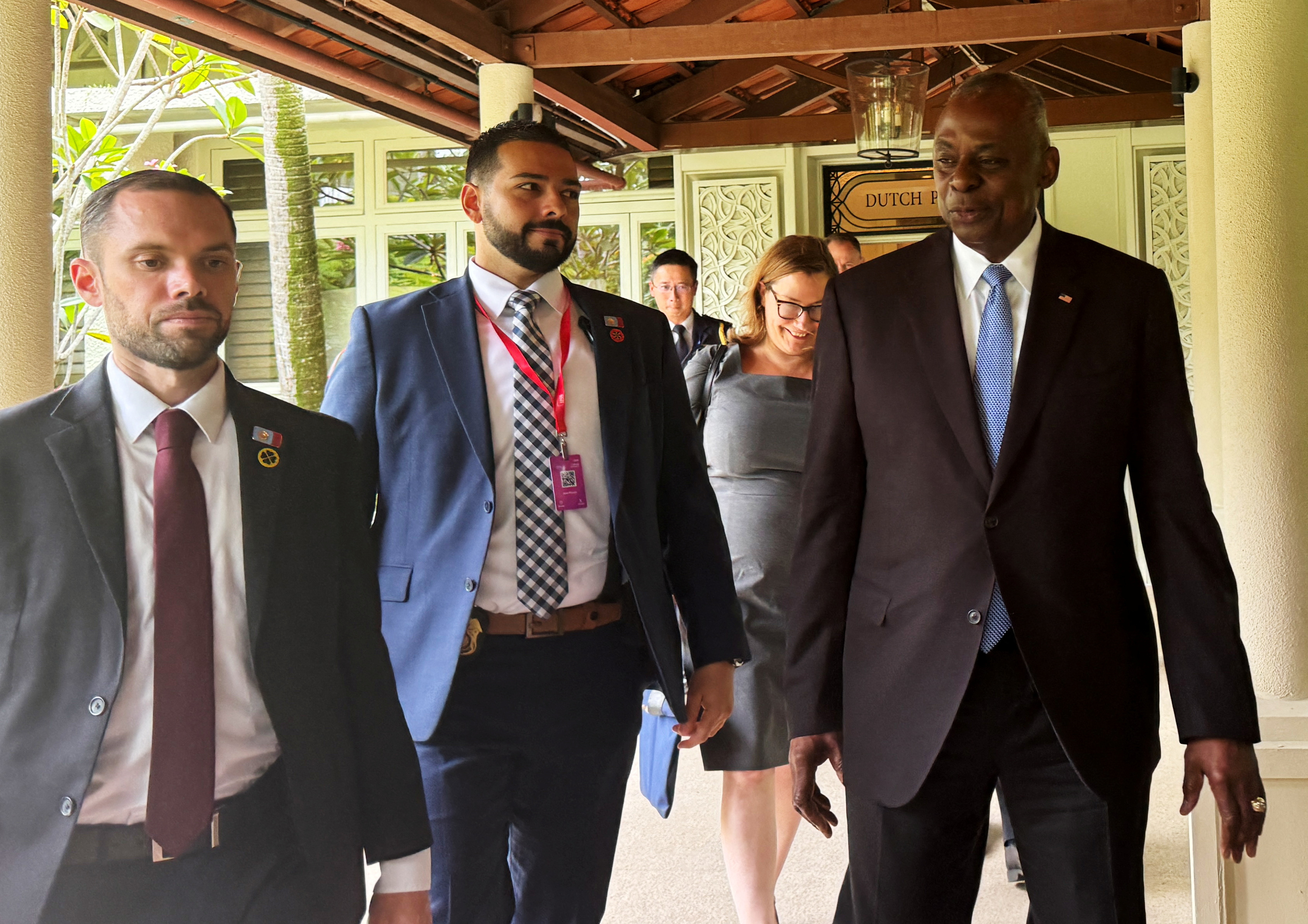
SOUTH CHINA SEA DISPUTE
Sign up here.
Reporting by Idrees Ali, Xinghui Kok, Fanny Potkin, Joe Brock and Tom Westbrook in Singapore, Mikhail Flores in Manila and Ben Blanchard in Taipei; Writing by Gerry Doyle; Editing by Jamie Freed and Raju Gopalakrishnan
Our Standards: The Thomson Reuters Trust Principles. New Tab , opens new tab

Thomson Reuters
National security correspondent focusing on the Pentagon in Washington D.C. Reports on U.S. military activity and operations throughout the world and the impact that they have. Has reported from over two dozen countries to include Iraq, Afghanistan, and much of the Middle East, Asia and Europe. From Karachi, Pakistan.

Xinghui leads the Singapore bureau, directing coverage of one of the region’s bellwether economies and Southeast Asia's main financial hub. This ranges from macroeconomics to monetary policy, property, politics, public health and socioeconomic issues. She also keeps an eye on things that are unique to Singapore, such as how it repealed an anti-gay sex law but goes against global trends by maintaining policies unfavourable to LGBT families. https://www.reuters.com/world/asia-pacific/even-singapore-lifts-gay-sex-ban-lgbt-families-feel-little-has-changed-2022-11-29/ Xinghui previously covered Asia for the South China Morning Post and has been in journalism for a decade.

World Chevron

Boeing Starliner capsule's first crewed test flight postponed minutes before launch
Boeing, whose commercial plane operations are in disarray, badly needs a win in space for its Starliner venture, a program several years behind schedule with more than $1.5 billion in cost overruns.

Yemen's Houthis conducted six operations targeting a U.S. aircraft carrier, a U.S. destroyer and three vessels in the Red Sea and the Indian Ocean, the Iranian-backed group's military spokesperson Yahya Saree said on Saturday.
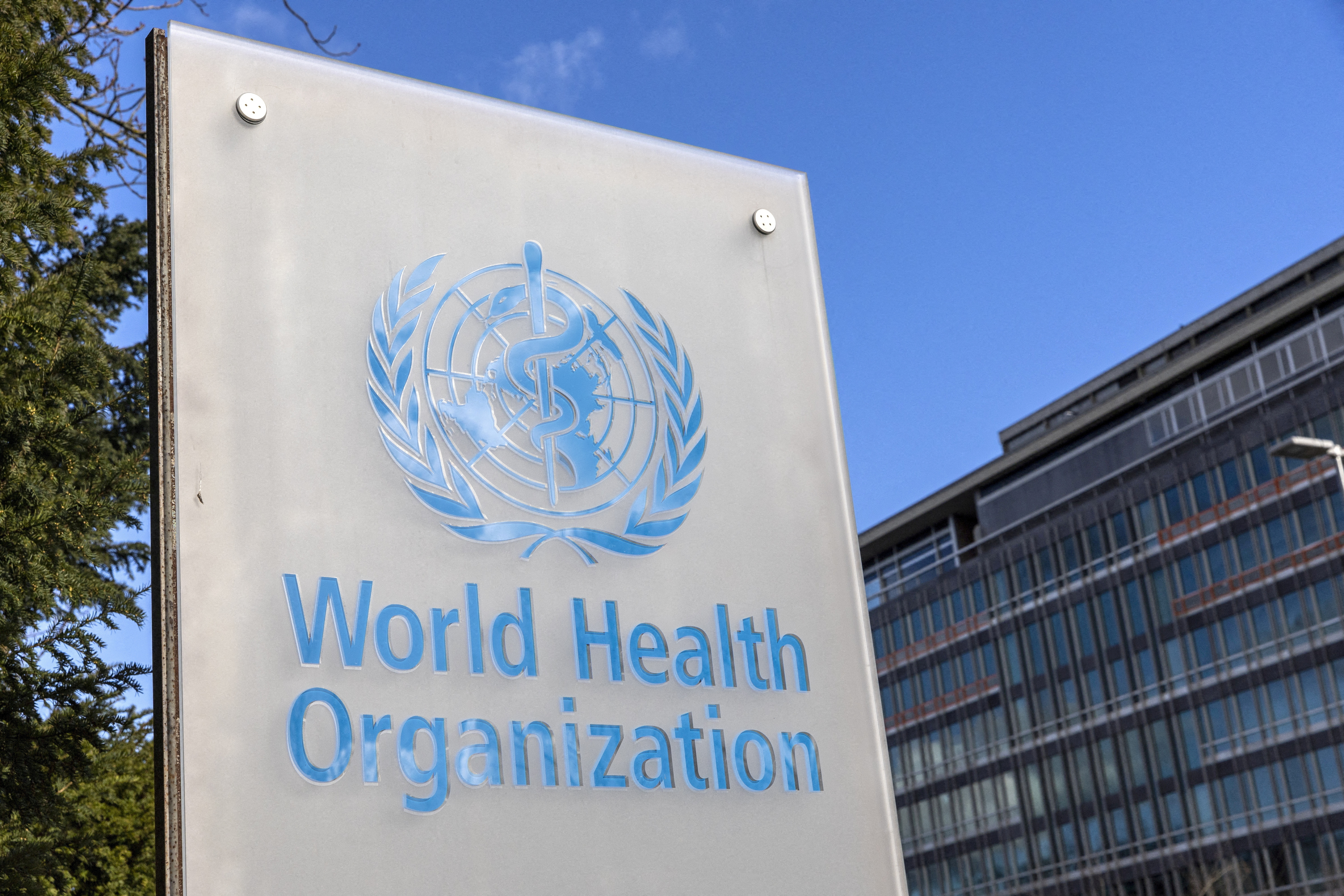
Advertisement
Supported by
NYU Nurse Is Fired After Calling the Gaza War a ‘Genocide’ in Speech
NYU Langone Health gave the nurse, Hesen Jabr, an award for her work. She said hospital officials then fired her because she made pro-Palestinian remarks in an acceptance speech.
- Share full article

By Joseph Goldstein
Earlier this month, NYU Langone Health bestowed an award on a labor and delivery nurse for providing compassionate care to mothers who had lost babies. But shortly after, the nurse said, the hospital fired her over the speech she gave when she accepted the award.
In it, she spoke of the suffering of Palestinian women amid the Israel-Hamas war, which she called a “genocide.” The nurse, Hesen Jabr, is not the first medical worker to be fired at NYU Langone, a major New York hospital system, over commentary about the Israeli-Palestinian conflict. The hospital is currently embroiled in a lawsuit by a prominent cancer researcher, who was fired from his job as the director of its cancer center after he posted a variety of anti-Hamas political cartoons. Some included offensive caricatures of Arab people.
A young doctor-trainee was also “removed from service” at an NYU Langone hospital on Long Island, according to the hospital, after being accused of posting a message on Instagram defending the Oct. 7 Hamas attack on Israel — though he was later quietly reinstated.
In her speech, according to a video she posted on social media , Ms. Jabr drew a connection between her work with grieving mothers in New York and the war in Gaza.
“It pains me to see the women from my country going through unimaginable losses themselves during the current genocide in Gaza,” said Ms. Jabr, who is Palestinian-American. “This award is deeply personal to me for those reasons.”
She added , “Even though I can’t hold their hands and comfort them as they grieve their unborn children and the children they have lost during this genocide, I hope to keep making them proud as I keep representing them here at NYU.”
Ms. Jabr said that these remarks led to her firing on May 22 after she returned to work following the ceremony. “As soon as I walked into the unit, I was dragged into an impromptu meeting with the President and Vice President of Nursing at NYU Langone to discuss how I ‘put others at risk’ and ‘ruined the ceremony’ and ‘offended people’ because a small part of my speech was a tribute towards the grieving mothers in my country,” she wrote in a post on Instagram. She said that she then worked most of her shift before being summoned to an office where she was fired and escorted off the premises.
Israel has categorically denied the accusation that it is carrying out a genocide in Gaza .
A spokesman for NYU Langone, Steve Ritea, confirmed that Ms. Jabr was fired following her speech, saying that there had been “a previous incident as well.”
“Hesen Jabr was warned in December, following a previous incident, not to bring her views on this divisive and charged issue into the workplace,” Mr. Ritea said in a statement. “She instead chose not to heed that at a recent employee recognition event that was widely attended by her colleagues, some of whom were upset after her comments."
“As a result, Jabr is no longer an NYU Langone employee,” he added.
Mr. Ritea did not say what the “previous incident” was. On Facebook, Ms. Jabr suggested there had long been workplace tensions. Her postings described heated political arguments on the labor and delivery floor. “The pure psychological warfare NYU has waged on me as a nurse, Muslim, Palestinian, and woman, has only left me resolute,” read one message she posted on Facebook.
Ms. Jabr’s activism dates back to her childhood: When she was in fifth grade in Louisiana, the American Civil Liberties Union filed a lawsuit on her behalf after she was forced to accept a Bible from her school principal. “This is not my first rodeo,” she said in an interview Tuesday evening.
Ms. Jabr, who had worked at NYU Langone since 2015, said that in recent months she had been questioned repeatedly by hospital administrators about her social media postings about Israel and the war in Gaza. She described her speech at the awards ceremony as “the straw that broke the camel’s back.”
Other employees around the country have been fired , suspended or investigated for their comments about the Israel-Hamas war. While some states, such as Connecticut, have restricted the ability of employers to fire workers for their opinions or speech, New York’s protections for workers are more limited .
In Ms. Jabr’s case, she had been invited to the lectern and delivered a brief speech at the awards ceremony, where, according to the hospital , she had received an award given to “a nurse who exemplifies what it means to provide compassionate care to patients and their families during perinatal bereavement.”
Before turning to the war in Gaza, Ms. Jabr expressed gratitude to her co-workers, saying the award belonged to them: “Truthfully, it does belong to all the nurses on labor who have held the hands of a grieving mother.”
In the interview, Ms. Jabr defended her speech and said talking about the war “was so relevant” given the nature of the award she had won.
“It was an award for bereavement; it was for grieving mothers,” she noted.
Joseph Goldstein covers health care in New York for The Times, following years of criminal justice and police reporting. More about Joseph Goldstein
Our Coverage of the Israel-Hamas War
News and Analysis
The Israeli military’s announcement that it had seized “tactical control” of a sensitive border strip between Gaza and Egypt comes after weeks of rising tensions between Egypt and Israel .
Israel’s national security adviser said that he expected Israel’s military operations in Gaza to continue through at least the end of the year , appearing to reject the idea of a quick end to the war.
The bombs used in the Israeli strike that killed dozens of Palestinians in a camp for displaced people in Rafah were made in the United States , according to weapons experts and a Times visual analysis.
A Fateful Encounter: In an Israeli prison infirmary, a Jewish dentist came to the aid of a desperately ill Hamas inmate. Years later, the prisoner became a mastermind of the Oct. 7 attack .
Getting Relatives Out: For Americans racing to evacuate their family members from Gaza, the closure of the Rafah border crossing into Egypt — the only way out for civilians — has thrown an already complicated system into disarray .
Awaiting Her Husband’s Release: Aviva Siegel was held captive by Hamas in Gaza with her husband until late November. She was one of 105 hostages released as part of a cease-fire deal.

IMAGES
VIDEO
COMMENTS
A dad who definitely has ears. Sometimes funny, always kind. Owed a cheeseball from Brendan Fraser.📬: [email protected]
How to now only prepare for your speech but also how to deliver in a clear, precise, and professional manner that delivers a presentation to remember. Most people fear public speaking but when ...
Follow us:Subscribe to #CitiTube here: bit.ly/3yszmHIFacebook: https://www.facebook.com/pg/CitiTVGH/Twitter: https://twitter.com/CitiTVGHInstagram: https://w...
The Speech Prof (@speechprof) on TikTok | 28.2M Likes. 504.9K Followers. Sometimes funny, always kind. 📪 - [email protected] the latest video from The Speech Prof (@speechprof).
Disclaimer: The podcast and artwork embedded on this page are from The Speech Prof, which is the property of its owner and not affiliated with or endorsed by Listen Notes, Inc. PODCAST SEARCH ENGINE You can use our website to search 3,357,402 podcasts and 197,593,021 episodes by people, places, or topics.
Chesko (born January 26, 1982), better known as The Speech Prof, is an American social media influencer and academic. Early life and education . Chesko's father immigrated to the United States from El Salvador. ... Chesko created his YouTube account TheRealSpeechProf in March 2021. Many of his videos discuss compassionate pedagogy and address ...
24 years as an educator, 15 years as a full-time college professor, and 4 years as a… · Location: Los Angeles Metropolitan Area · 254 connections on LinkedIn. View The Speech Prof AKA ...
SpeechProf, Los Angeles, California. 21,246 likes · 244,211 talking about this. Sometimes funny, always kind. : [email protected]
Apparently I…have an absurdly large knowledge gap when it comes to owls.
The Speech Prof AKA Professor Chesko's Post ... YouTube: I feel like YouTube is where you go when you want to graduate into a professional creator. Even with 310k followers there, I am not quite ...
On September 18, 2007, Carnegie Mellon professor and alumnus Randy Pausch delivered a one-of-a-kind last lecture that made the world stop and pay attention. It became an internet sensation viewed by millions, an international media story, and a best-selling book that has been published in more than 35 languages. And it all started with Randy »
Oh, Speech Prof (and everyone else reading this), it's get SOOO much worse when you start needing long term care. I can't even begin to tell you the horror. It's a crisis and an epidemic to become elderly... but it's invisible from the public discourse because it happens to the elderly (who are already invisible) and for the families who ...
The vast majority of tips I hear from "social media experts" rarely match up with my own experience growing my platforms. TikTok: 425k+ Instagram: 250k+ YouTube: 240k+ Facebook: 50k+ And ...
SpeechProf Reels, Los Angeles, California. 25,438 likes · 289,396 talking about this. Sometimes funny, always kind. : [email protected]. Watch the latest ...
The Speech Prof @speech_prof The best proof that I never intended to be a content creator before stumbling onto a million+ followers is that my name was taken and had to be different on every platform TikTok: SpeechProf Instagram: TheSpeechProf YouTube: TheRealSpeechProf Twitter: Speech_Prof #consistency
Watch the full conversation here: https://youtube.com/live/bq67Gb40GjEPalestinian-American historian and Edward Said Professor of Modern Arab Studies at Col...
A Communication Studies professor's emotional response to a sexist podcast discussing how women supposedly "let themselves go" after giving birth is going viral on social media. Professor Chesko, who goes by @speechprof on TikTok, filmed the video in response to seeing three men from the No Filter podcast speaking about how they'd break up with ...
The Speech Prof. creating silly little videos about kindness and comedy. 404 members. 15 posts. Join for free. Home. About.
9142 Likes, 1276 Comments. TikTok video from The Speech Prof (@speechprof): "I'm also wildly impressed by my Gen-Z students. If this goes down, I'm honestly not sure who wins. 🤣". gen x worst generation. Gen Xoriginal sound - The Speech Prof.
Tom Ginsburg grew up in Berkeley, California, in the years after the free speech movement swept the UC Berkeley campus. As a child, he'd hear about the importance of free expression from those who took part in the movement, especially his father, and learned to speak freely, question his own knowledge, and listen closely to those with whom he disagreed. The afterglow of those protests for ...
Share your videos with friends, family, and the world
Republican Senator J.D. Vance (R-OH) reacts to former President Donald Trump calling the US a 'fascist state' during remarks the day after a New York jury convicted him on 34 felony counts of ...
After the jury in Donald Trump's New York criminal trial returns a verdict, the judge likely will lift his gag order barring the Republican presidential candidate from speaking publicly about ...
Speech PROF. 534 likes. For radio and TV broadcasters, public speakers, MC/Compere, religious leaders, entrepreneurs and corporate individuals who want to enhance their speech mastery and unveil the...
A federal judge in 2021 dismissed all of the NRA's claims apart from two free speech counts against Vullo. The Manhattan-based 2nd U.S. Circuit Court of Appeals in 2022 said those also should have ...
As Israel's attacks on Rafah spark public outrage, Prime Minister Benjamin Netanyahu's war campaign is coming under fire despite continued support from the United States, raising questions ...
REUTERS/Idrees Ali Purchase Licensing Rights. SINGAPORE, May 31 (Reuters) - The U.S. and Chinese defence chiefs locked horns on Taiwan in their first face-to-face meeting in two years on Friday ...
In this powerful video, we bring you one of the most inspiring speeches by the renowned Kenyan scholar and orator, Prof PLO Lumumba. Known for his brilliant ...
May 28, 2024. Earlier this month, NYU Langone Health bestowed an award on a labor and delivery nurse for providing compassionate care to mothers who had lost babies. But shortly after, the nurse ...
Dateline Philippines: De La Salle University International Studies Professor Renato de Castro assesses President Ferdinand Marcos Jr.'s speech at the Shangri...